When Is It Safe To Disclose a Mental Health Challenge to Co-Workers?
First, your hair stylist. Then, your best friend at work. After that, the team. (They know.) Your investors? Later. And maybe one day... the world!
This Q&A originally appeared in Fortune magazine.
Do you think you could have shared your mental health conditions publicly BEFORE you were professionally successful, and still have been successful? Or was the fact that you had already achieved professional success what allowed you to be open? —Zack
No, I don’t think I could have shared before we succeeded. I wouldn’t have had the courage to, and I feared it might be career-limiting.
Then again, it was almost seven years ago that I had my I-can’t-deny-this-any-longer moment with my Bonobos colleagues and investors. As of today, I think it’s becoming more possible to be candid about mental health. I hope we can move to a world where I could have been more open, sooner, at least selectively with my leadership team and board.
Some entrepreneurs ask me when to tell their VCs about the mental-health challenge or mental-health diagnosis they wrestle with. I always say the same thing: at a breakfast meeting, four months after you’ve closed the round and hit your numbers. Nobody cares about your neurodivergence if you’re performing—and most VCs actually know enough to know that most founders have more going on than meets the eye.
With your team, I think it’s doable, even now. Perhaps especially now. The truth is, they know. They know you deal with stuff because they’re around you. And the vulnerability you share in disclosing will multiply their respect for you. More important, it’ll give those team members the space to reciprocally share their stuff with their colleagues, and potentially you as well, and bring their full selves to work.
Wouldn’t that be cool?
Andy Dunn is the founding CEO of Bonobos and Pie and the author of Burn Rate: Launching a Startup and Losing My Mind.




